- Home
- Hammond Innes
The Strode Venturer
The Strode Venturer Read online
Contents
Cover
About the Book
About the Author
Also by Hammond Innes
Dedication
Title Page
Epigraph
Chapter I
Chapter II
Chapter III
Chapter IV
Chapter V
Chapter VI
Chapter VII
Copyright
About the Book
What could link the slick world of London boardrooms, an isolated island race in the Maldives and the mysterious voyages of a battered ship skippered by a brooding alcoholic? It falls to Geoffrey Bailey to unlock the mystery, but first he must overcome both family tragedy and the unpredictable treacheries of land, sea and big business.
About the Author
Ralph Hammond Innes was born in Horsham, Sussex, on 15 July 1913 and educated at Cranbrook School, Kent. He left school aged eighteen, and worked successively in publishing, teaching and journalism. In 1936, in need of money in order to marry, he wrote a supernatural thriller, The Doppelganger, which was published in 1937 as part of a two-year, four book deal. In 1939 Innes moved to a different publisher, and began to write compulsively, continuing to publish throughout his service in the Royal Artillery during the Second World War.
Innes travelled widely to research his novels and always wrote from personal experience – his 1940s novels The Blue Ice and The White South were informed by time spent working on a whaling ship in the Antarctic, while The Lonely Skier came out of a post-war skiing course in the Dolomites. He was a keen and accomplished sailor, which passion inspired his 1956 bestseller The Wreck of the Mary Deare. The equally successful 1959 film adaptation of this novel enabled Innes to buy a large yacht, the Mary Deare, in which he sailed around the world for the next fifteen years, accompanied by his wife and fellow author Dorothy Lang.
Innes wrote over thirty novels, as well as several works of non-fiction and travel journalism. His thrilling stories of spies, counterfeiters, black markets and shipwreck earned him both literary acclaim and an international following, and in 1978 he was awarded a CBE. Hammond Innes died at his home in Suffolk on 10th June 1998.
OTHER NOVELS BY HAMMOND INNES
Air Bridge
Attack Alarm
Atlantic Fury
Campbell’s Kingdom
Dead and Alive
Delta Connection
Golden Soak
High Stand
Isvik
Killer Mine
Levkas Man
Maddon’s Rock
Medusa
North Star
Solomons Seal
Target Antarctica
The Angry Mountain
The Big Footprints
The Black Tide
The Blue Ice
The Doomed Oasis
The Land God Gave to Cain
The Last Voyage
The Lonely Skier
The Strange Land
The Trojan Horse
The White South
The Wreck of the Mary Deare
Wreckers Must Breathe
To
Jeppy and Erd
for all their kindness and encouragement over the years
HAMMOND INNES
The Strode Venturer
I will nowe referre the reader to the following discourse with the hope that the perilous and chargeable labors and indevours of such as thereby seeke the profit and honor of her Majesty, and the English nation, shall by men of quality and vertue receive such construction, and good acceptance, as them selves would looke to be rewarded withall in the like.
Sir Walter Raleigh
I
1. STRODE ORIENT
MARCH, 1963. Looking back through my diary, as I begin this account of the strange means by which the prosperity of the company I now serve was founded, I find it difficult to realize that there was a time when I had never been to the Maldives, had scarcely ever heard of Addu Atoll. The island we now call Ran-a-Maari had only recently been born the night I flew into London from Singapore. The stewardess had woken me shortly after four with a cup of coffee and through my window I could see the moon falling towards the west and a great bank of black cloud. The plane whispered softly as it lost height. The first lights showed below us, long ribbons of amber, orange, white and blue. And then the great sprawling mass of the city seen only as slashes of arterial brilliance, the blank spaces in between dotted with the pinpoints of individual street lights like thousands upon thousands of tiny perforations in a black sheet of paper. It was breathtaking, beautiful—immensely impressive; and it went on and on until the pattern of lights was spread from horizon to horizon.
By the time we landed the moon was gone and the sky was clouded over. A chill north-westerly wind blew a light drizzle across the apron and London Airport glimmered damply as we made our way into the terminal building. At that dead hour before the dawn the Customs and Immigration officers, all the night staff, moved with careful deliberation. But though they were slow, they still possessed that quiet air of politeness, even kindness, that always surprises one when coming home after a long sojourn abroad. I hadn’t been back for over three years and the consideration with which they treated the passengers erased some of the weariness of the flight. “Any watches or cameras?”
“No, only what’s on the list.”
It was quite a long list for I thought I was returning to England for good, but he chalked my bags and let me through without charging me anything. He had a cold and perhaps he didn’t want to be bothered. “If you’d declared some sunshine I might have charged you,” he said with a tired smile. His face looked white under the lights, even the dark tan of the passengers was sallowed by the glare.
I went down the escalator and out through Channel Nine with the man who had been my companion throughout the flight, but we didn’t talk. We had said all there was to say in the long hours we had been cooped up in the plane together and now we were going through the process of readjustment that is common to all travellers at the moment of separation into individual existence. Dawn was only just beginning to break as the coach took us into London—a slow, reluctant dawn coming grey out of a grey sky. The wet road surface reflected the pallid gleam of the street lighting. There wasn’t much traffic, heavy lorries mainly and the first milk roundsmen, and in the thickening lines of semi-detached and terraced houses a scattering of lights as London began to stir from its sleep.
We crossed the Chiswick and Hammersmith fly-overs and were into the area where the dual carriageway had slashed like a sword through residential suburbs, the scars showing in the blank ends of houses, in the dead ends of streets abruptly severed. “I’d forgotten how bloody big this city was,” my companion said. His name was Hans Straker; he was half Dutch, a big florid man with close-cropped hair bleached the colour of pale straw by the Indonesian sun. He’d been in rubber most of his life and now, in his late forties, he’d been forced to sell his estates and get out. His love of Java, where he’d lived and worked in recent years, had been soured by the difficulties of operating under the Sukarno Government and the shifts he’d been put to to get his money out. Between Singapore and London I’d been given his whole life story including accounts of his early travels in the Melanesian Islands and as far afield as Polynesia. His hobby was seismography and he had talked a lot about the records he’d kept of submarine disturbances, his theory that the bed of the Indian Ocean was in process of change—a theory he expected to be confirmed by the international hydrographic survey due to commence shortly. He was almost as bitter about the loss of his seismometer as he was about his estates.
But now that we had reached London he was strangely silent, as though he
, too, was over-awed by the sprawl of the great city. Which was perhaps as well since I was no longer in a mood to listen. A dawn arrival after a long flight is not the best moment to face up to one’s prospects. I’d very little money and no job to come back to. On my own for the first time since I’d joined the Service at the start of the war, I was conscious of a sense of uneasiness, a lack of confidence in myself that I’d never experienced before.
My decision to leave the Navy had been based on an assessment of my prospects following Britain’s application for membership of the Common Market. I spoke French and German and the way the newspapers talked at that time of the economic future of the country I thought I’d have no difficulty in finding a job. Even so, with two children at school in England, I’d never have left the Service on the strength of the gratuity alone. What finally decided me was a letter from a London firm of solicitors offering to purchase on behalf of a client the Strode Orient shares my mother had left me. It was so unexpected, so opportune that it seemed like the hand of providence. And the price they offered was well above the market value of the shares. I had accepted at once and at the same time had applied for my discharge. And then everything had gone wrong; France had blocked Britain’s entry into Europe and the London solicitors had written to say that the Company’s Registrar had refused transfer of the shares under the terms of an agreement signed by my mother in 1940. They had added that they had seen the letter of agreement and were satisfied that it was binding on her heirs and assigns.
I could understand my mother’s acceptance of the terms for I knew her circumstances at the time, but that did not soften the blow. Indeed, it revived all the anger and bitterness I had felt as a kid when she had tried to explain to me what had happened to my father and the great shipping line we had owned. The shock of the solicitor’s letter was aggravated by the fact that I had been relying on the money to start me in civilian life, for by then I knew the form. Not one of the firms I had written to had held out any prospect of employment. They wanted technicians, specialists, men with experience in their own particular field, and all I knew about was ships and how to run them. Shipping was in a hell of a mess and here I was in London, unemployed and damn’ near unemployable, the only capital I possessed unsaleable, and nothing to show for my twenty-odd years in the Navy but the gratuity and a small pension.
Something of this my companion must have gathered in the long hours we’d spent together for he suddenly said, “All this new building. I haven’t been here for years, but it’s still the most exciting city in the world. The sheer ramifications …” His small china-blue eyes stared at me. “I envy you. You’re young enough to get a kick out of starting all over again.”
It was all very well for him to talk; his wife was dead and he hadn’t any children. “School bills have to be paid,” I said.
That seemed to touch a loss he felt deeply for he snapped back, “Christ, man! You talk as though it were a millstone. You don’t know how lucky you are.” And he added, “If I were your age and a family behind me, by God I’d rip this city apart to get myself the niche I wanted.” He didn’t know about Barbara. I hadn’t told him our marriage was just about on the rocks. He shifted angrily in his seat, his quick little eyes looking me over as though I were a stranger whose worth he was trying to assess. “But maybe you don’t want anything, just security—the same sort of security you’ve had in the Navy.” He hesitated as though searching for the right words, and then he said, “All your working life you’ve been sheltered from the raw rough world outside, and now you’re scared. That’s it, isn’t it? You’re scared and beginning to feel you’d like nothing better than to get into some big outfit that’ll recreate for you the sheltered world you’ve just left.” He gripped my arm, a gesture of friendliness that was meant to ease the probing bite of what he’d just said. “Take my advice, Bailey. Find out what you want, find something you really care about. When you know what you want the rest follows. But don’t just drift into something because it offers security. Security is never worth a damn. We’re meant to live, and to live means living dangerously, half on the edge of trouble, half on the edge of achievement. Myself, I’ve never felt really alive unless I was fighting something, and here I am, more than ten years older than you and starting all over again. And I’m excited. Yes, dammit, I’m thrilled by the prospect.”
I couldn’t see it then. Our circumstances were so entirely different; though the price he’d got for his plantation might be low it must still represent quite a nice amount of capital. But I was to remember his words much later and realise that they were true. We parted at the Air Terminal and he gave me his address—the Oriental Club. “If you care for a drink sometime….” He left it at that and as I picked up my case and went over to Information it never occurred to me that I should see him again. I asked for a cheap hotel and the girl at the desk fixed me up at one of those small residential places off the Cromwell Road. I took a taxi there, but the room wasn’t ready of course, and it was still too early for breakfast. I signed the register and had a wash, and then, leaving my bags with the night porter, I walked out into the grey loneliness of London. The traffic was still light, the clatter of milk bottles the dominant sound. A newsboy was delivering papers and across the road a lighted shop front showed two policemen in sharp relief; they stood quite still staring at a bosomy model dressed in a black brassière and matching elastic girdle. Lights were on in some of the upper windows, boarding houses and shops mingling haphazardly with still-lifeless offices, and up a side street a glimpse of trees and an old Regency square.
There is something about London at this hour of the morning, a hint of greatness past and present, the sense of a leviathan stirring, stretching itself to meet the challenge of a new day. It never failed to excite me and tired though I was, I too felt the challenge. I joined two early workers waiting for a bus and when it came, its side lights and the red bulk of it rumbling to a stop in the empty street, I climbed to the upper deck and sat in the front to watch Knightsbridge and Piccadilly, all the old, remembered, familiar façades roll by. It was only later when I switched to a bus going City-wards that I was consciously aware of a destination, and all the way down Fleet Street and up Ludgate Hill I had the sense of a pilgrimage, for the building I was going to visit was the power-symbol of the man who had broken my father.
It was a long time ago, more than thirty years, and I’d been away at school so that I’d only felt the impact of it through my mother and through our changed circumstances and the void my father left in our lives. At that age you don’t feel bitterness; you accept things as they are, adapting quickly and not thinking too much. It had meant Dartmouth to me instead of an expensive school and Henry Strode was just a name, a sort of monster whom I’d get even with some day. Now, of course, he was dead, too, and when I’d met his son sitting cross-legged on the deck of a dhow beached on an island in the Persian Gulf I’d felt no hostility towards him. He wasn’t that sort of a man and anyway our circumstances seemed oddly reversed—I was in command of a minelaying exercise and he was bumming a ride in a sambuq down to Mukalla.
We had reached the Bank and I got out at the bus stop by the Royal Exchange. The City was still dead, the rush-hour not yet begun. I walked slowly along Cornhill, staring at the still empty buildings, wondering what I was doing there. This wasn’t my sort of world, which was probably why in all the years since my father’s death I’d never bothered to visit the scene of the battle he’d fought and lost up here in this close-packed, money-conscious square mile. Where Bishopsgate joined Gracechurch Street I came to Leadenhall Street and five minutes later I was in the shipping quarter, looking across at the façade of Strode House. It was smaller than I had expected, but perhaps that was because I had just passed the new Lloyds building. Also it looked dirty, but then so did most of the buildings in this area of the City; shipping had been depressed for so long that the only office block that looked as though it had been cleaned in living memory was the palatial headquarters of
the Cunard Company.
Somewhere behind me, in St. Mary Axe, a clock struck eight. I crossed the street to stand on the pavement, looking up at Strode House with its scrolls and figures and pseudo Dutch gables all outlined in a coating of grime and pigeon droppings. It was a solid, pretentious building, unspeakably self-conscious—a merchant prince’s house crying aloud the power and riches of its dead builder.
The door was open and I went in. Marble floors and a big curved staircase with oil paintings, and hanging from the centre of a cupola that didn’t seem to fit the design, a magnificent Venetian chandelier. An old man in his shirt sleeves appeared from the door on my left. He was carrying a bucket and a broom with a cloth wrapped round its head. I asked him what time the staff arrived. “Some at nine, some at nine-thirty,” he mumbled and spilled some of the dirty water from the bucket on the floor with the deliberate movements of a man who has been doing the same thing every morning for as long as he can remember. “You wanting to see anyone in partic’lar?” There was no interest in his voice as he spread the dark water with slow sweeps of the broom.
“Mr. Strode,” I said.
“Oh, one of the directors. Well, I wouldn’t know when they come in. I finish at nine.”
“Mind if I look at the pictures?” There was one half-way up the stairs that had caught my eye, a head and shoulders portrait familiar even at that distance.
The broom paused in a stroke and he turned and inspected me out of old watery eyes. “This ain’t a pitcher gallery, yer know. But no ’arm in looking.” He nodded. “You go ahead.” And he added as I climbed the stairs, “Don’t often get people coming ’ere at this time o’ the morning. An’ nobody don’t bother about the pitchers any more. They’re all dead, anyway, ’cepting the two in the boardroom.”
It had come as a shock to see my father’s face hanging there on the dark turn of the staircase, and as I stood in front of it the years rolled back and I was a kid again running down to greet him as he entered the house. That was when we’d lived in Eaton Square and there’d been a butler and every night people in to dinner or my parents out somewhere. I’d seen very little of him, but there was one holiday I could remember when we’d gone on a ship. I must have been about six or seven then and we’d had the ship to ourselves, no other passengers, so it must have been a freighter. He’d spent a lot of time with me then, up on the bridge, taking me round the engine-room. But something had gone wrong and he’d had to leave suddenly, and after that it hadn’t been the same with only my mother and some sort of governess, though the captain had still let me come up to the bridge. It was all a long time ago, the house in Eaton Square a dim memory, and this portrait, though familiar, quite unlike the father I’d thought I could remember—more rigid, more impersonal.

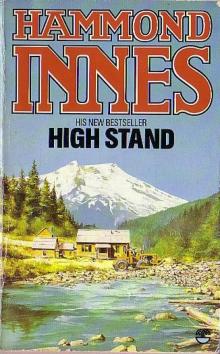 High Stand
High Stand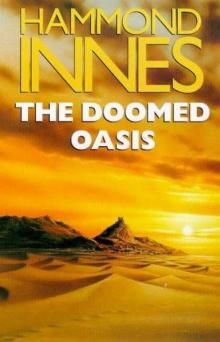 The Doomed Oasis
The Doomed Oasis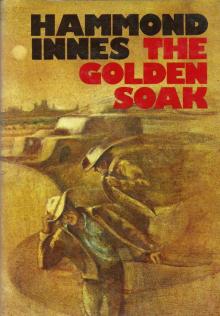 Golden Soak
Golden Soak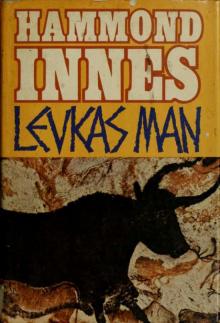 Levkas Man (Mystery)
Levkas Man (Mystery)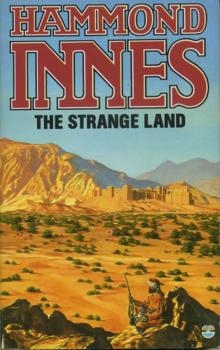 The Strange Land
The Strange Land Dead and Alive
Dead and Alive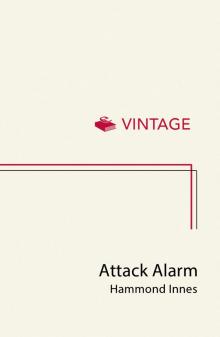 Attack Alarm
Attack Alarm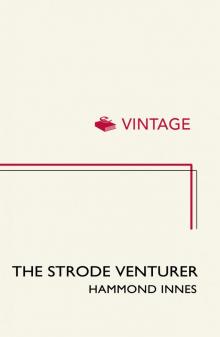 The Strode Venturer
The Strode Venturer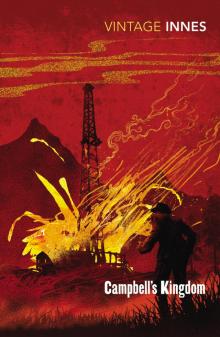 Campbell's Kingdom
Campbell's Kingdom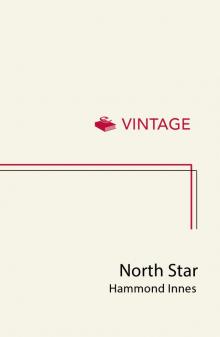 North Star
North Star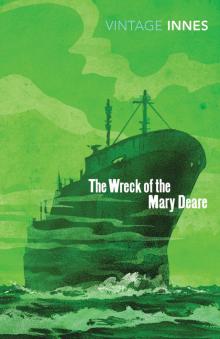 The Wreck of the Mary Deare
The Wreck of the Mary Deare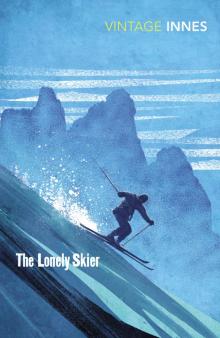 The Lonely Skier
The Lonely Skier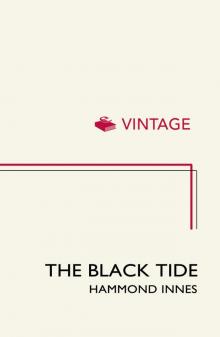 The Black Tide
The Black Tide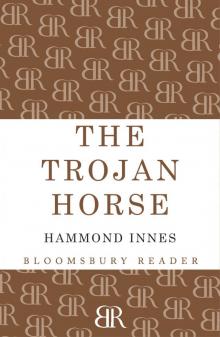 The Trojan Horse
The Trojan Horse Medusa
Medusa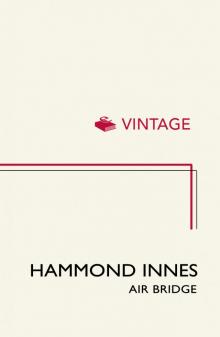 Air Bridge
Air Bridge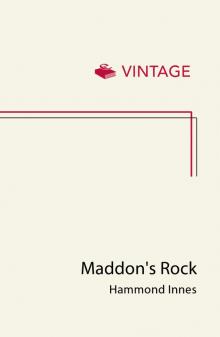 Maddon's Rock
Maddon's Rock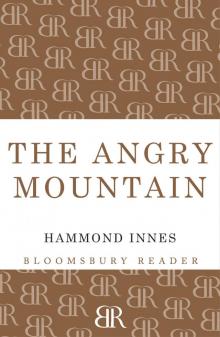 The Angry Mountain
The Angry Mountain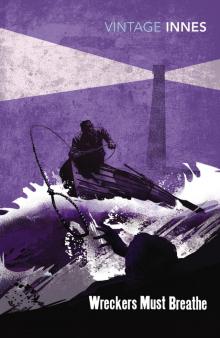 Wreckers Must Breathe
Wreckers Must Breathe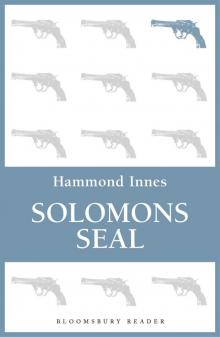 Solomons Seal
Solomons Seal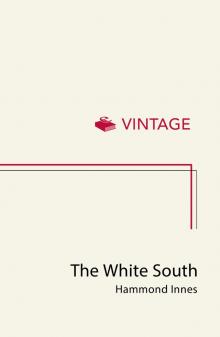 The White South
The White South